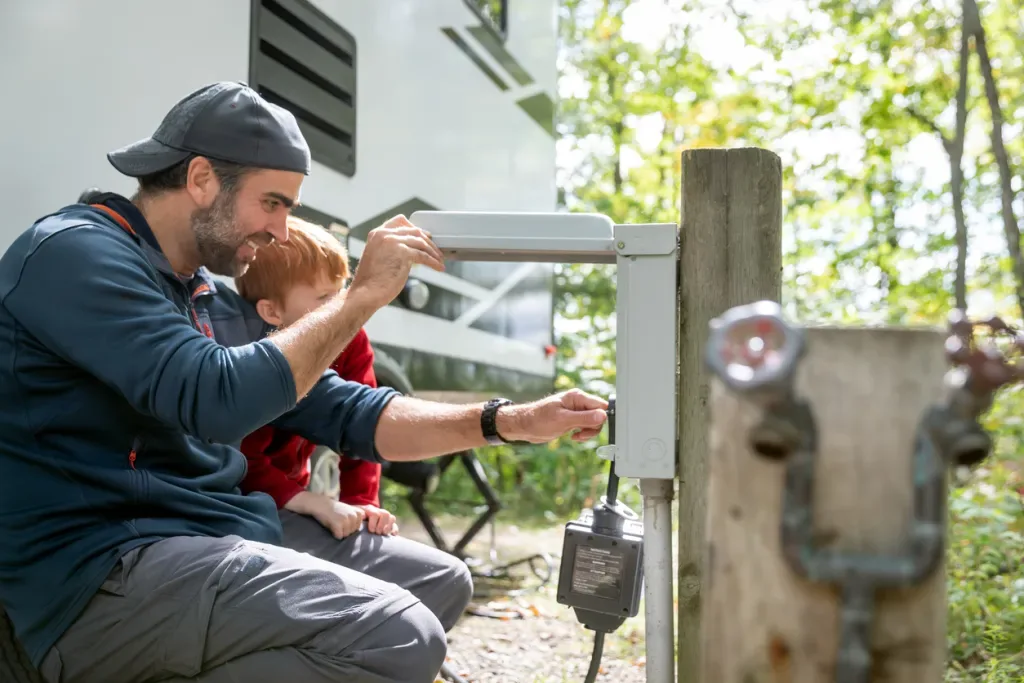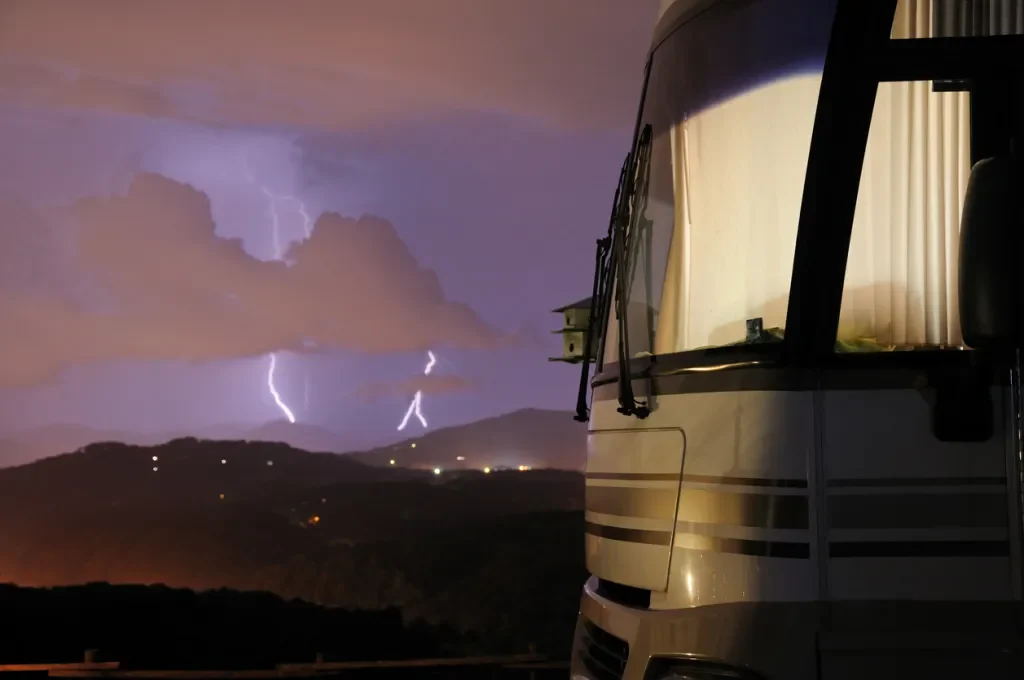If you don’t protect your RV surge protector, there’s a chance it’ll disappear when you’re not looking.
Unfortunately, a thief will look for any opportunity to make a quick buck. If you want to avoid becoming a victim, you’ll need to think ahead.
Today, we’ll help you to take steps toward securing your surge protector.
Let’s check it out!

What Is an RV Surge Protector?
An RV surge protector protects your camper from spikes in electrical current. It acts as a barrier between the power source and the sensitive components. It functions like the gadgets homeowners use to safeguard expensive electronics from lightning. However, instead of a television, it’s defending a recreational vehicle and all of its electronics.
Voltage spikes can occur without notice due to lightning and other unforeseen circumstances. Without something to absorb the event, refrigerators, air conditioners, and water heaters could get destroyed inside an RV. A single incident could result in several thousand dollars in damages.
Because of the job they do, we consider these to be essential pieces of equipment. You take a risk anytime you plug your power cable into a power source without one. However, they’re not all created equal. Some offer more security than others.
While there are some areas where you can try to save a buck, this isn’t one of them. In general, a budget-friendly model will provide minimal defense. You’re wasting your money if it’s unable to do the job.
Does an EMS Protect Your RV Better?
RVers often confuse surge protectors with an EMS (electrical management system). While they may perform similar tasks, they have some distinct differences. If you want to maximize the safety of your rig, it might be time to upgrade.
Both items guard against high voltages and come in portable and hardwired options. However, those are the only things they have in common. An EMS offers additional benefits and protects your rig better than surge protectors.
One of the most significant advantages it offers is the shield from low voltages. These situations can be just as dangerous as influxes of current. They’re most common during peak camping season when people in a campground run multiple air conditioners. A facility’s electrical system may be unable to meet the demand.
If the unit detects low voltage, it cuts the flow of electricity. Many continue to monitor and test the supply of power. Once the optimal conditions return, it restores the flow of electricity. This can be especially helpful if you’re away from your camper when the incident occurs. You may not even know there was an issue.
Unfortunately, the premium EMS product will typically come with a premium price. Many owners find the increased cost worth every penny for the peace of mind it provides. Luckily, it’s a one-time expense, giving you less to worry about during your adventures.
Best Ways to Protect Your Surge Protector From Thieves
What’s keeping your gear safe while it’s doing its job? We’ve heard several stories from fellow RVers who’ve had their equipment stolen at their campsite. If you’re not careful, yours could be next. Luckily, there are some ways to avoid becoming a victim.
Many of these devices come with a ring to attach a lock. You can feed a chain or cable through this ring and secure it. Like most security measures, it’ll only slow a thief down. Luckily, most criminals fear making noise or getting caught and will move on their way. They’ll return with the proper tools if they want to swipe something.
A hardwired surge protector is another excellent way to protect yourself from thieves. This requires some electrical expertise but is relatively straightforward. The product gets installed inside your rig and is out of sight. That’s about as safe as it can get! A thief will likely never see it. And if they do, they risk electrocution trying to remove it.
Secure your whole rig: Is It Easy to Break Into An RV? (And, How to Make It Harder).
Should You Protect Your Surge Protector From the Weather?
It’s no secret that electricity and weather elements often don’t play nicely with each other. Protecting your surge protector, especially from water, is essential whether it’s rain, snow, or extreme temperatures.
While many of these units have safety features against moisture, it’s typically best to do all you can to avoid putting them to the test. It’s best to store your equipment out of the elements when not using it. In addition, when using it, keep it out of moisture, especially pools of water.
Some campsites are better than others when it comes to drainage. Sadly, we’ve seen some sites that turn into miniature lakes during heavy rains. If water pools around your electrical box, it could get submerged and cause severe damage. Keep an eye on this potential hazard during heavy downpours and take action before it becomes a problem.

How Often Should You Replace a Surge Protector?
A typical surge protector should last anywhere from three to five years. Various situations can cause it to experience a shortened life. RVing can naturally be hard on equipment, resulting in exposed wiring, bent prongs, and other issues. If you notice any physical damage to your unit, it’s time to replace it. It’s better to be safe than sorry.
These devices are capable of redirecting and suppressing high voltages for a short amount of time. Wear and tear over time naturally occurs and reduces their effectiveness. Most units come with test modes, so you know it’s still working correctly. Again, when in doubt, replace your unit every few years. It’s a small price to pay for the peace of mind knowing it’s safe.
Make RV life easier with: These Weird RV Tools Actually Work Wonders.
Don’t Forget Your Protection
If you’re an RV owner, keeping your rig safe is essential. A surge protector is one way of protecting your camper from potential risks. Unless you want it to grow legs and walk away, secure your device every time you use it. While not much can stop a determined thief, you can make it difficult for them. Don’t be an easy target.
We’ll Help You Find the Best Free Camping in the USA
You should give it a try!
As a matter of fact, these free campsites are yours to enjoy. Every time you pay federal taxes, you’re contributing to these lands.
Become a FREE CAMPING INSIDER and join the 100,000 campers who love to score the best site!
We’ll send you the 50 Best Free Campsites in the USA (one per state). Access the list by submitting your email below: